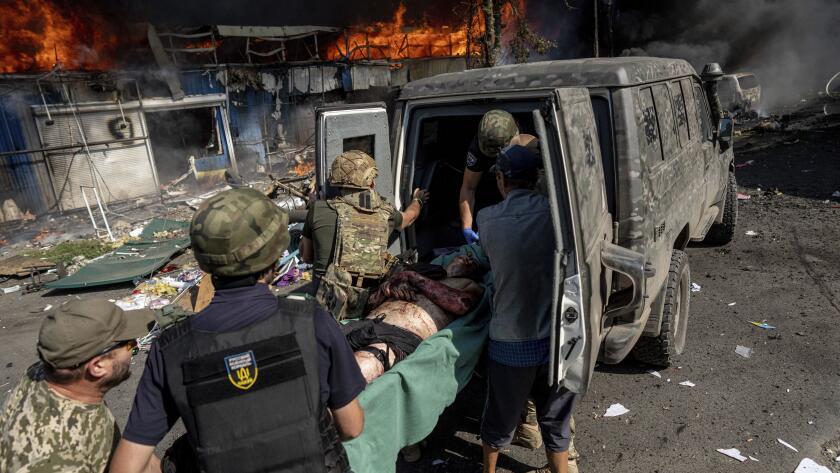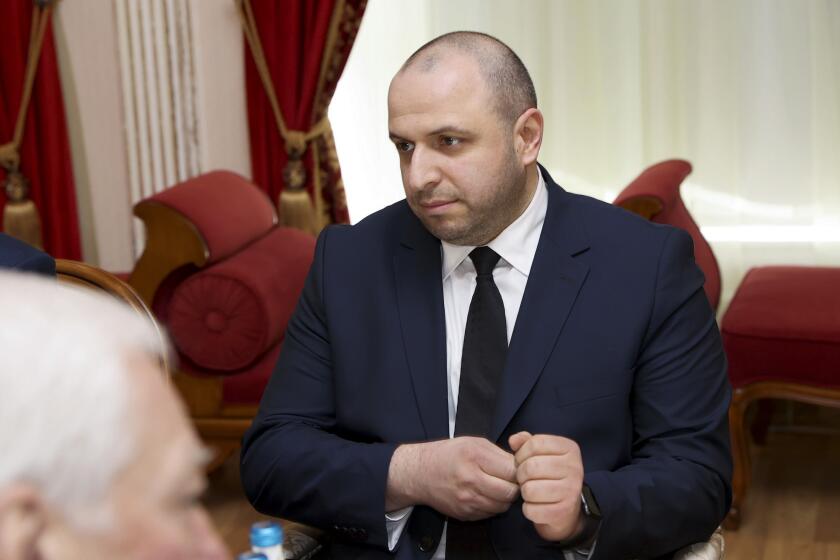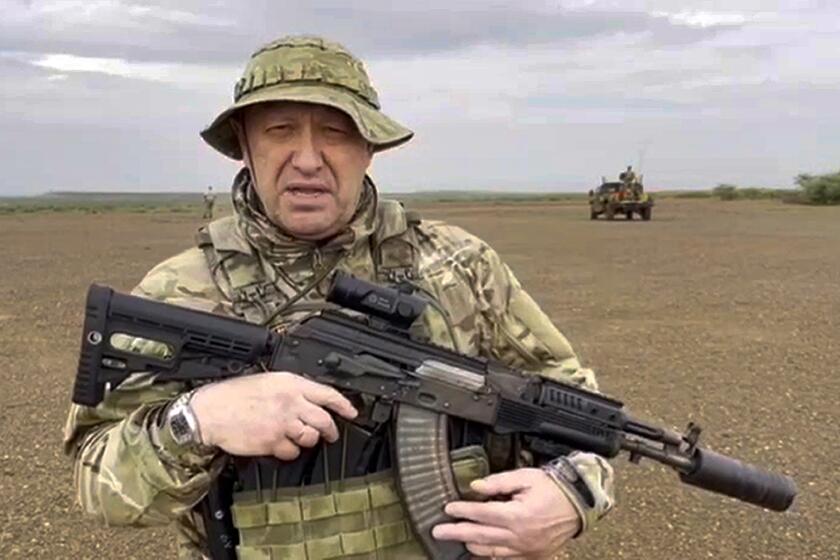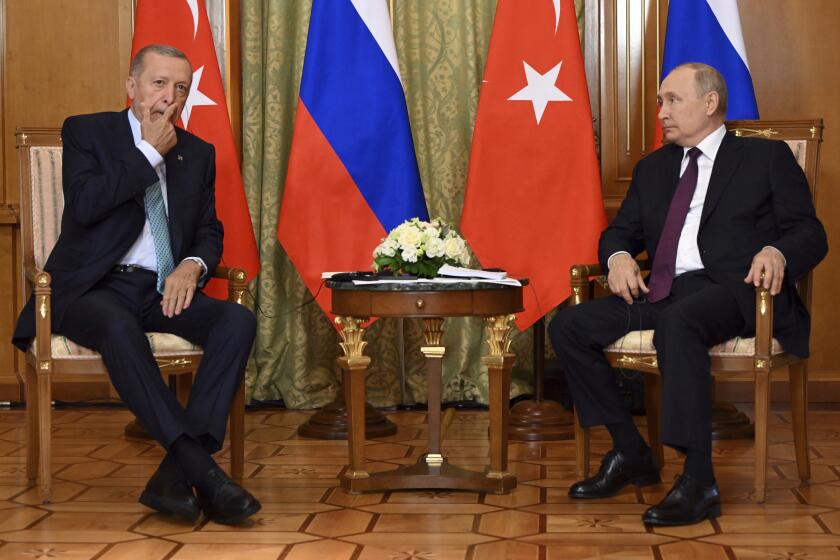In wartime Ukraine, Blinken must make case for U.S. commitment despite sagging support at home
At least 16 people were killed when Russia shellfire hit a market in eastern Ukraine the same day U.S. Secretary of State Antony J. Blinken visited Kyiv.
WASHINGTON — With U.S. public support for the war in Ukraine sagging as the battle to eject Russian forces moves slowly, America’s top diplomat is on a drama-filled mission to reassure doubters and shore up a united front.
In an unannounced trip to Kyiv, the Ukrainian capital, Secretary of State Antony J. Blinken on Wednesday acknowledged the critical moment facing Ukraine in fighting Russia and in building a postwar future. But he said he had “tremendous confidence” that the stakes were too high for Ukraine to fail.
As if to underscore the persistent danger, Russian shelling of a market in the eastern city of Kostiantynivka killed at least 16 people Wednesday and wounded more than two dozen others, Ukrainian officials said. The Associated Press said its reporters saw bodies covered by blankets while emergency workers put out fires along rows of market stalls.
And just hours before Blinken arrived in Kyiv on an overnight train from Poland, Russian cruise missile strikes on the capital, which has been relatively safe during most of the war, killed at least two people, Ukrainian officials said.
The State Department said Blinken’s trip, his fourth to Ukraine since the war started and kept from the public until after he reached Kyiv, was aimed at assessing the progress of the counteroffensive that Ukraine launched in recent months and determining future needs and plans for reconstruction, energy, humanitarian recovery and Ukraine’s war-torn economy.
Coming at a politically sensitive time on both U.S. domestic and international fronts, the timing of the Blinken visit is widely seen as an urgent move to rally support for what has become the unplanned and unwanted centerpiece of the Biden administration’s foreign policy.
Ukrainian President Volodymyr Zelensky says Defense Minister Oleksii Reznikov will be replaced this week by Rustem Umerov, a Crimean Tatar lawmaker.
U.S. officials have voiced concern about waning interest in and opposition to the war that supporters see as necessary to stop an illegal land grab by Russian President Vladimir Putin.
“We want to make sure that Ukraine has what it needs, not only to succeed in the counteroffensive, but has what it needs for the long term, to make sure that it has a strong deterrent,” Blinken said before a meeting with Ukrainian President Volodymyr Zelensky. “We’re also determined to continue to work with our partners as they build and rebuild a strong economy [and] strong democracy.”
Blinken on Wednesday announced a $1-billion package in new U.S. aid, which he said would include training in the U.S. for Ukrainian pilots in the use of F-16 fighter jets. Several European members of the North Atlantic Treaty Organization are promising to donate their fighter jets to Ukraine after receiving Washington’s permission to do so.
In the U.S., several hard-line Republican politicians have questioned continuing aid to Ukraine, which in more than 18 months of fighting totals more than
$43 billion in dispersed and promised weaponry, including tanks, air defense systems and controversial cluster bombs.
Biden administration officials insist that those voices are in the minority and that bipartisan support remains strong.
Perhaps more important is a decline in the American public’s favorable view of Ukraine. According to a CNN poll released last month, 48% of those who responded said the U.S. “should do more to stop Russian military actions in Ukraine,” while 51% said the U.S. “already has done enough.” Although that is a fairly even split, another poll conducted by CNN soon after the start of the war last year found that two-thirds of respondents said the U.S. should do more to help Ukraine.
After Wagner chief Yevgeny Prigozhin is buried, what’s next for his Russian private army, once a key Kremlin tool in Ukraine and Africa?
The doubts come ahead of the presidential election next year, and with a potentially brutal winter in Ukraine looming. In addition to complicating battlefield maneuvers, a harsh winter could take a significant toll if Russia repeats its tactics of last year that included bombarding critical Ukrainian infrastructure, destroying electrical grids and heating systems.
There is international urgency as well. The Biden administration hopes to shore up what has been a large but not universal coalition of nations supporting Ukraine.
This weekend, leaders of the world’s top economies will meet in India, with Ukraine set to be a major topic. Russia and its sometimes ally China are represented in the Group of 20, and countries including host India have expressed reservations over supporting Ukraine’s war effort.
“To get absolute consensus on a statement on Ukraine is challenging,” Jake Sullivan, President Biden’s national security advisor, said this week.
Russian President Vladimir Putin says the deal that allowed Ukraine to export grain despite the war won’t be restored until Moscow’s demands are met.
Biden will attend the summit, but neither Putin — who is under indictment by the International Criminal Court for alleged war crimes in Ukraine — nor China’s Xi Jinping will attend.
Even more important is the annual General Assembly of the United Nations to be held in New York this month. Although the body last year voted by a large margin to condemn Russia’s invasion of its neighbor, some of that solidarity has faded, especially in the so-called global south — countries in Latin America and Africa that have economic or historical ties to Russia, or are simply reluctant to get involved in a war that they think doesn’t concern them.
As the wedge potentially widens, Russia is receiving weapons from Iran and seeking military equipment from North Korea, according to U.S. intelligence officials. China, while friendly with the Kremlin, has not yet supplied major weapons to Moscow, U.S. officials say.
“We are in that back-to-school phase: Everybody is coming together ... for the U.N. General Assembly [and] the Ukrainians have an important mission in New York to continue to explain, to their allies and partners around the world, what’s going on and their continued need for support,” said a senior State Department official who briefed reporters traveling with Blinken and spoke anonymously in keeping with department protocols. “And it’s important for us to continue to lead that global effort to support them. And so having a chance to consult and align before we get to New York is very, very important.”
Start your day right
Sign up for Essential California for the L.A. Times biggest news, features and recommendations in your inbox six days a week.
You may occasionally receive promotional content from the Los Angeles Times.
Ukraine’s highly anticipated counteroffensive got a sluggish start as it tried — often in vain — to punch through heavily fortified Russian lines, triggering more doubts about the country’s ability to prevail over a much-larger foe. Confidence was further rattled when Zelensky abruptly fired his defense minister this week.
Ukraine has begun to gain some ground in recent weeks, U.S. and British military analysts say, taking back several villages that Russia had seized and breaching a number of Russian defensive positions.
Blinken cited those gains in a news conference late Wednesday when asked what he had learned that could convince Americans that this is a battle worth fighting.
“In the current counteroffensive, we are seeing real progress over the last few weeks,” he said. “We are doing everything we can to maximize our support for Ukraine as it pursues the counteroffensive. ... Ukrainians are fighting for their own country, for their own future, for their own freedom. Russians are not. And that gives me tremendous confidence that Ukraine will prevail.”
Ukrainian Foreign Minister Dmytro Kuleba, who joined Blinken at the news conference, said he believed American politicians across the board understood the war was not “just about Ukraine.”
“It’s about the future of the world, and we should defend this world jointly,” Kuleba said. “If the West cannot win this war, then what is the war that the West can win?”
Blinken’s trip is the first in which he will spend the night in the country. In addition to meeting with officials, he visited a mental health program run by Ukrainian First Lady Olena Zelenska, and laid a wreath at the Berkovetske cemetery in memory of armed forces members who died defending the country.
Blinken and Kuleba later stopped by a McDonald’s, held up as a symbol of businesses that returned quickly to Kyiv after the Russian invasion in a sign of solidarity and resilience. The two men ordered fries.
More to Read
Sign up for Essential California
The most important California stories and recommendations in your inbox every morning.
You may occasionally receive promotional content from the Los Angeles Times.















